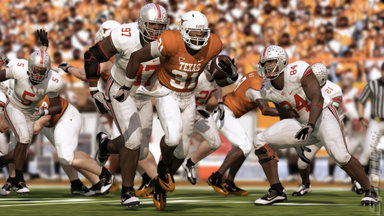Footballer Loses Likeness Rights to EA
EA’s First Amendment rights bigger than quarterback's.

"Cover your face, lads! The can't take what they can't see!"
Electronic Arts has been back in court again, this time claiming that they're allowed to use the likenesses of real people without their permission. In a rather terrifying turn of events, the US legal system has actually agreed that it's allowed to do so under the Constitution's First Amendment.
At the centre of the argument is EA's NCAA Football series and a former college player called Ryan Hart. The National Collegiate Athletic Association doesn't allow the use of real players' names in the game as they're amateurs. However, though EA claims that the in-game footballers don't represent real-life players, everything from jersey number and position to height and weight are 'aligned' so they're recognisable.
Hart didn't like this and set the lawyers on EA. Claiming that the company were using his image illegally, the presiding judge instead ruled that Electronic Arts were well within their First Amendment rights. It would appear that his likeness – and that of every other NCAA player – are up for grabs in a free for all.
Two points came up that led the judge to state that EA was legally right. The first is that players can be modified and altered in-game, meaning that Hart's image could be created by anyone, not just the creators of the game. EA is basically arguing that it's just giving gamers a helping hand. The second, that the use of Hart's image isn't trademarked, is a much more dangerous precendent.
As long as the NCAA maintains that its players must remain untouched and can't be paid for the use of their likenesses this situation will remain. NFL players cut a deal years ago to be compensated for appearing in the Madden series but that's not allowed for college players.
The upshot is that EA and other companies now have a legal right to use the image of whoever they please in their games for free. A name change is all that seems to be required for an amateur footballer to be used whether they like it or not. Of course, this is just in the USA; what effect this may or may not have on their games worldwide is as yet unknown. We can only hope that sense will prevail.
Source: Internet Cases
At the centre of the argument is EA's NCAA Football series and a former college player called Ryan Hart. The National Collegiate Athletic Association doesn't allow the use of real players' names in the game as they're amateurs. However, though EA claims that the in-game footballers don't represent real-life players, everything from jersey number and position to height and weight are 'aligned' so they're recognisable.
Hart didn't like this and set the lawyers on EA. Claiming that the company were using his image illegally, the presiding judge instead ruled that Electronic Arts were well within their First Amendment rights. It would appear that his likeness – and that of every other NCAA player – are up for grabs in a free for all.
Two points came up that led the judge to state that EA was legally right. The first is that players can be modified and altered in-game, meaning that Hart's image could be created by anyone, not just the creators of the game. EA is basically arguing that it's just giving gamers a helping hand. The second, that the use of Hart's image isn't trademarked, is a much more dangerous precendent.
As long as the NCAA maintains that its players must remain untouched and can't be paid for the use of their likenesses this situation will remain. NFL players cut a deal years ago to be compensated for appearing in the Madden series but that's not allowed for college players.
The upshot is that EA and other companies now have a legal right to use the image of whoever they please in their games for free. A name change is all that seems to be required for an amateur footballer to be used whether they like it or not. Of course, this is just in the USA; what effect this may or may not have on their games worldwide is as yet unknown. We can only hope that sense will prevail.
Source: Internet Cases
Read More Like This
Comments
Syria in flames, Libya on the verge of democracy after a bloody civil war, the Eurozone currency teetering on the bring of collapse....
HOLD THE FRONT PAGE! Some amateur footy players want paid for their faces being on a video game.
HOLD THE FRONT PAGE! Some amateur footy players want paid for their faces being on a video game.
bring = brink
:o)
:o)
